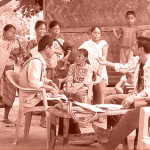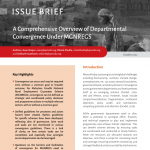
NREGA wage payments through banks: Taking Stock
17 May 2010
In May 2008, the Government declared that wage payments, under the National Rural Employment Guarantee Act, the world’s largest rural public works programme, would be made through banks. According to a recent announcement, under the new system of financial inclusion 8.60 NREGA workers accounts have been opened and about 82% of wages i.e. close to 17,000 crores have been disbursed through these accounts up to December 2009 – accounting for 70% of the expenditure under the programme. Although this new system has been hailed as a foolproof, cost-effective solution to reduce leakages and to promote greater transparency, the transition was rushed and several complications with the new system are now becoming apparent.
Delays in wage disbursement: The issue of delays in wage payments is one of the most serious problems with the system of bank payments. Reports from several states including Jharkhand, West Bengal, Chhattisgarh, Rajasthan, Madhya Pradesh, Uttar Pradesh and West Bengal indicate the problem of delayed payments and dwindling interest in employment under the NREGA is rampant across several states.
It is a well established argument that the coverage of banks and post offices in rural India is patchy and as a consequence workers especially in remote parts of the country find it difficult to travel long distances to collect their wages causing delays in payments. Interestingly though findings from a survey in UP and Jharkhand indicate that close to 90% of workers who lived more than 5 km from a bank/post office expressed a preference for bank payments over cash despite the distance, indicating the deeper problems lie elsewhere. An important cause of the severe delays in the disbursement of wages is the institutional incapacity of rural banks to handle the huge volume of accounts. The shortage of staff and technology is most acute in post offices where accounts are managed manually through log journals.
However, the cause of delayed payments is more complicated than this. There are several bottlenecks associated with the different steps in the wage payment process: Filling the muster roll, measuring work and matching with attendance, preparing payment orders, sanctioning of cheques by officials and finally crediting of wages in workers accounts by the bank. Centre-state financial norms are not always clear and often mired in politics causing significant delays in the flow of funds from the central to state governments. A detailed discussion on these delays at different levels can be found in a recently published article by Reetika Khera called ‘Wages of Delay’.
Although such delays legally entitle workers to unemployment benefit, compensation has rarely been paid which is a clear violation of the Act. The government has acknowledged this gap and has sought to rectify it by directing state governments to ensure that the ‘twin legal mandates’ of wage payment within 15 days and through institutional accounts are ‘scrupulously adhered to’. A host of directives follow such as holding of a monthly Gram Rozgar Diwas at the panchayat level in which issues of payment backlogs will be cleared, strict monitoring of timely payment of wages by the District Programme Coordinator etc.
The ‘Business Correspondent Model’ which is currently being rolled out by the government is an attempt to address this problem of delayed payments and ensure that the rural poor have timely access to financial services. How this works is that the business correspondent (BC) would, on behalf of the banks, for a commission, deliver financial services to ‘clients’ though appropriate technology like handheld computer devices. However, given that the problem of delays is more complex than a simple issue of institutional access, the solutions might lie beyond the scope of this administrative ‘innovation’.
Corruption: While the move of separating the implementation and payment agencies has countered the earlier forms of corruption such as siphoning of funds, some forms of embezzlement have persisted and some new forms have emerged. The first is through ‘deception’ where often the abhikarta (implementing agency) in collusion with the bank officials withdraws money from the accounts of workers without their knowledge. The second is through ‘exploitation’ where genuine workers withdraw their wages themselves but are forced to hand over part of their money to the contractor or sarpanch based on a pre-decided ‘deal’. The third method is where workers ‘collude’ with the implementing agency and fake names are entered in the muster roll on the basis of which wages are withdrawn.
While the first type of embezzlement can be effectively dealt with through strict enforcement of certain minimum safeguards such as ensuring money is only withdrawn by the account holder. The other two types of embezzlement are perhaps more difficult to counter because they are borne out of an essentially feudal, exploitative set up in which rural banks function.
Taking strict action against such corruption, the government has restated that unfair practices in the system of wage payments will be punishable under section 25 of the Act. However the record for invoking this clause has been quite abysmal. While enforcing this penalty clause which allows for a fine up to 1000 will ensure accountability to some extent, there is a pressing need to restore transparency safeguards already built into the act. Public scrutiny of wages through reading out muster rolls and regular updating of job cards needs to be reinstated. This is a powerful practice because it enables workers to verify their attendance and monitor wage payments themselves, thereby curbing corruption.
The switch to bank payments has without a doubt provided substantial protection against embezzlement and is a critical step towards ensuring greater accountability in the disbursement of wages under the NREGA. However, the issue of delays in wage payment needs to be tackled swiftly by both streamlining processes and mechanisms under the system of bank payments as well as reinforcing traditional safeguards.
Anindita Adhikari is a Research Associate with the ASER Centre.





